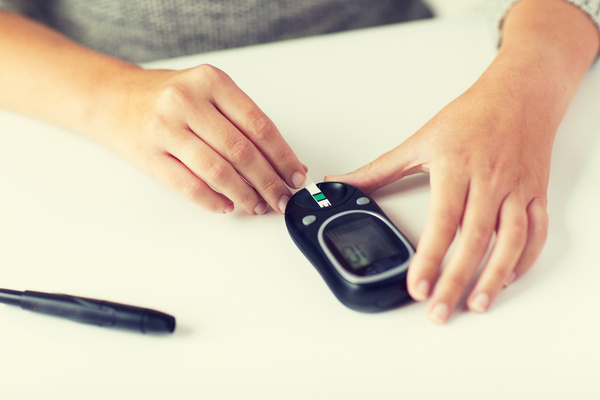Library
Subscribe
Healthy Blood Sugar & Diabetes
Published on Wed Nov 7, 2018 - 3 min read

If you don’t have chronically elevated blood sugar or Diabetes, you know someone who does. Likely you know many people who struggle to control their blood sugar. The complications of Type II Diabetes are many and include blindness, kidney disease, Alzheimer’s, heart disease, stroke, infections, and more1. In the U.S. 10 percent of the population has Type II Diabetes, that’s over 30 million people. What is even more shocking is that 84 million adults have pre-diabetes, which directly (and quickly) precedes diabetes2. Of pre-diabetics, 90% are completely unaware they have it3. Taken together over half of the U.S. population has or are on their way to getting Type II Diabetes4.
There is good news though. Type II Diabetes and pre-diabetes are 100% preventable and, in some cases, reversible5. It all comes down to preventing something called insulin resistance: a metabolic syndrome where cells fail to respond to insulin. Usually, the body makes insulin in response to blood sugar and healthy cells respond by opening up and burning the sugar for energy. If cells do not respond to insulin, then blood sugar remains high and metabolic damage follows6. The primary target of lifestyle & dietary changes, supplements, and many medications is to restore insulin sensitivity. Here are our top steps for preventing America’s fastest growing disease7:
Step 1: Remove foods that promote inflammation and high blood sugar.
- Refined sugars, especially those found in soda and other sugary drinks harshly spike insulin and over time may cause cells to stop responding to insulin and burn out insulin-producing cells of the pancreas8.
- Grains such as bread, pasta, cookies, and cakes are full of simple carbohydrates that turn into sugar over time and keep blood sugar levels chronically elevated9.
- Hydrogenated oils are marketed as “vegetable” oils but in reality, are industrially processed
seed oils that are boiled, bleached, and chemically extracted. These oils are in virtually all fried foods and include canola, cottonseed, soybean, and any oil labeled “vegetable.” Consuming these oils causes extreme inflammation and is directly linked to insulin resistance10.
Step 2: Incorporate lifestyle changes that promote healthy blood sugar levels.
- Lack of exercise is a significant risk factor for Diabetes11. The good news is that you don’t have to spend hours in the gym every week to get the benefits. Current research has proven that just 1 minute of intense daily exercise gives the same benefits as daily 45-minute workouts!12
- Mental, emotional, work, and family stressors can all play a role in raising blood sugar. One of the best ways to relieve stress is regular exercise13. Supplements are also a great way to recover from stress. Try taking lemon balm14 and green tea15 in the morning, Ashwagandha16 at noon and dinner time, and kava17 or valerian18 at night to keep stress in check.
- The importance of sleep cannot be overstated19. A recent study finds that one night of sleep
deprivation and six months of a high-fat diet could both cause insulin resistance to a similar degree, demonstrating the importance of good sleep for healthy blood sugar levels20.
Step 3: Add sugar balancing supplements to your daily regimen.
- Berberine was shown to be just as powerful as the anti-diabetic medication Metformin without side effects. Berberine not only lowers blood sugar but also reduces cholesterol and helps fight off chronic infections21. Try taking 500mg up to three times daily before meals.
- Cinnamon is well known for its sugar busting effect. It does this by reducing insulin resistance. In one particularly fantastic study type 2 diabetics with uncontrolled blood sugar levels ate just 1 gram of cinnamon daily and noticed drastic reductions in blood sugar and cholesterol in only three weeks22.
- Gymnema Sylvestre is a shrub native to India and Australia used for thousands of years for sugar control, inflammation, and even snake bites23. Modern research shows that Gymnema lowers sugar cravings, blocks sugar absorption, and can also help rejuvenate the pancreas to produce more insulin and prevent burnout, a hallmark of advanced Diabetes24.
The saying “An ounce of prevention is worth a pound of cure” has never been more accurate than for diabetes. We hope you can incorporate many of our blood sugar tips and keep your blood sugar in a healthy range.
[References]
- https://www.webmd.com/alzheimers/guide/alzheimers-diabetes-link
- https://www.cdc.gov/diabetes/data/statistics/statistics-report.html
- https://www.cdc.gov/features/diabetesprevention/index.html
- http://www.latimes.com/science/sciencenow/la-sci-sn-diabetes-in-america-20170718-
htmlstory.html
- https://www.sciencedirect.com/science/article/pii/S0168822705000628
- https://www.niddk.nih.gov/health-information/diabetes/overview/what-is-diabetes/
prediabetes-insulin-resistance
- https://www.ncbi.nlm.nih.gov/pmc/articles/PMC3068646/
- https://www.hsph.harvard.edu/nutritionsource/carbohydrates/carbohydrates-and-blood-
sugar/
- https://www.ncbi.nlm.nih.gov/pubmed/17760498
- https://www.ncbi.nlm.nih.gov/pmc/articles/PMC2654180/
- www.luzimarteixeira.com.br/wp-content/uploads/2009/06/diabetes-and-exercise-2003.pdf
- https://well.blogs.nytimes.com/2016/04/27/1-minute-of-all-out-exercise-may-equal-45-
minutes-of-moderate-exertion
- http://www.diabetes.org/living-with-diabetes/complications/mental-health/stress.html
- https://www.ncbi.nlm.nih.gov/pmc/articles/PMC4245564/
- https://www.sciencedirect.com/science/article/pii/S0378874102002179
- http://citeseerx.ist.psu.edu/viewdoc/summary?doi=10.1.1.324.8921
- https://www.ncbi.nlm.nih.gov/pubmed/10653213
- https://www.ncbi.nlm.nih.gov/pubmed/24055511
- http://care.diabetesjournals.org/content/38/3/529
- https://www.sciencedaily.com/releases/2015/11/151104134039.htm
- https://www.ncbi.nlm.nih.gov/pmc/articles/PMC2410097/
- https://www.ncbi.nlm.nih.gov/pubmed/14633804
- https://www.sciencedirect.com/science/article/pii/S2213422016301755
- https://www.sciencedirect.com/science/article/pii/0378874190901064
Published By:
 Bryan Bradford
Bryan Bradford